Febvin-Palfart: Difference between revisions
Jump to navigation
Jump to search
Knorrepoes (talk | contribs) m (Text replace - "'''Origin/meaning :'''<br/>" to "====Origin/meaning====") |
Knorrepoes (talk | contribs) m (Text replace - "|width="15%"|50 px|right |}" to "|width="15%"|50 px|right |}<seo title="Armorial de France, Armoires, Blason" />") |
||
| Line 3: | Line 3: | ||
|width="70%" align="center" |'''Heraldry of the World<br/>Civic heraldry of [[France]] - [[Armorial de France]]''' | |width="70%" align="center" |'''Heraldry of the World<br/>Civic heraldry of [[France]] - [[Armorial de France]]''' | ||
|width="15%"|[[File:France.jpg|50 px|right]] | |width="15%"|[[File:France.jpg|50 px|right]] | ||
|} | |}<seo title="Armorial de France, Armoires, Blason" /> | ||
'''FEBVIN-PALFART''' | '''FEBVIN-PALFART''' | ||
Revision as of 10:10, 6 November 2012
| Heraldry of the World Civic heraldry of France - Armorial de France |
FEBVIN-PALFART
Département : Pas-de-Calais
Origin/meaning
The arms were adopted on March 12, 1996.
The arms are devised by a member of the local council, deriving the name Febvin from fève, or broad bean. The horseshoe, or fer à cheval, was also considered a possibility. He thus combined the two symbols, which, at the same time, are two symbols for the agricultural character of the municipality. The bordure with the 11 bezants symbolises the 11 hamlets in the municipality.
Literature : Bréemersch et al., 1996.

